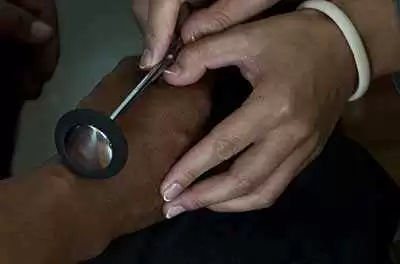Celiac.com 02/01/2016 - Among celiac researchers, there's been a good deal of professional curiosity about the clinical and immunological relevance of anti-neuronal antibodies in celiac disease with neurological manifestations. At present, doctors don't know very much about the clinical and immunological features in celiac disease patients with neurological problems, and many of them want to know more.
 Researchers estimate that about 10% of celiac disease patients have neurological issues, with the majority of those suffering from anti-neuronal antibodies (NA) to central nervous system (CNS) and/or anti-neuronal antibodies to the enteric nervous system (ENS). With that in mind, the question of the importance of such antibodies in celiac patients with neurological problems becomes important.
Researchers estimate that about 10% of celiac disease patients have neurological issues, with the majority of those suffering from anti-neuronal antibodies (NA) to central nervous system (CNS) and/or anti-neuronal antibodies to the enteric nervous system (ENS). With that in mind, the question of the importance of such antibodies in celiac patients with neurological problems becomes important.
Celiac.com Sponsor (A12):
To get a better picture of the issue, a team of researchers in Italy recently set out to assess rates of anti-neuronal antibodies, and to assess their correlation with neurological disorders and bowel habits in people with celiac disease. The research team included G. Caio, R. De Giorgio, A.Venturi, F. Giancola, R. Latorre E. Boschetti, M. Serra, E. Ruggeri, and U.Volta. They are all associated with the Department of Medical and Surgical Sciences, University of Bologna and St. Orsola-Malpighi Hospital, Bologna, Italy.
For their study, the team investigated anti-neuronal antibodies to central nervous system and enteric nervous system in 106 celiac disease patients and in 60 controls with autoimmune disorders, using indirect immunofluorescence on rat and/or primate cerebellar cortex and intestinal (small and large bowel) sections. Their results showed that 21% of celiac patients were positive for IgG NA to central nervous system (titer 1:50 - 1:400); nearly half of those patients showed neurological dysfunction, compared with just 8% without. (P< 0.0001).
Of the 26 celiacs (24%) with IgG anti-neuronal antibodies to enteric nervous system, 11 out of 12 with an antibody titer greater than 1:200 had severe constipation. Only one patient with cerebellar ataxia and intestinal sub-occlusion was positive for anti-neuronal antibodies to central nervous system and enteric nervous system. Anti-neuronal antibodies to central nervous system and enteric nervous system were found in 7% and 5% of controls, respectively.
These results confirm that the presence of anti-neuronal antibodies to central nervous system can be regarded as a marker of neurological manifestations for people with celiac disease. High titer anti-neuronal antibodies to enteric nervous system are associated with severe constipation.
The presence of anti-neuronal antibodies to central nervous system and enteric nervous system is a big red flag for an immune-mediated disease path that leads to central neural impairment, and gut dysfunction with associated constipation.
Source:
- Open Original Shared Link


.webp.bd46bd1009c45e98c3082487f52ff41b.webp)





Recommended Comments